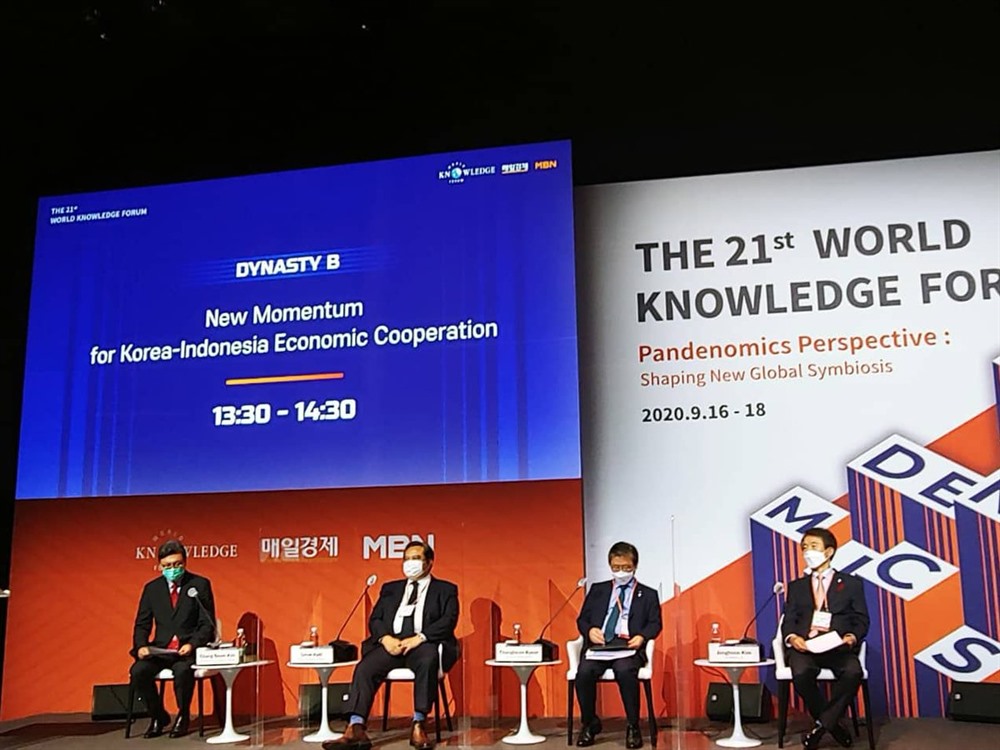 Economy
Economy

Experts urged more international cooperation to fight the pandemic when they met online and offline at the 21st World Knowledge Forum (WKF2020) in Seoul on Wednesday.

|
Experts urged more international cooperation to fight the pandemic when they met online and offline at the 21st World Knowledge Forum (WKF2020) in Seoul on Wednesday.— Photo wkforum
HÀ NỘI — Experts urged more international cooperation to fight the pandemic when they met online and offline at the 21st World Knowledge Forum (WKF2020) in Seoul on Wednesday.
While former United Nations Secretary General Ban Ki-moon called for enhanced global cooperation and solidarity to achieve common prosperity against future crises after the pandemic, former UK Prime Minister Theresa May, as one of the key speakers at the forum said: “I think this is such an important issue that we all work together to ensure that we’re dealing with this pandemic as a world community. I am very sorry that in the early stages of this pandemic, we saw very little real international cooperation around how to deal with the pandemic. Countries dealing with it in their own way, rather than perhaps sitting down and discussing and sorting out what the best way to deal with the pandemic was.”
Hoping to have more international cooperation in vaccine development around the world, May said: “Social distancing will not turn into national distancing.”
May said the pandemic could exacerbate world trade without boosting co-operation, saying: ‘For those of us who share the values, who still believe in world trade, stand up and be counted to work together, to ensure that we can maintain those global frameworks that have done the world well.”
In another session at the forum, Professor Klaus Schwab, chairman of the World Economic Forum (WEF), said all interested parties, including the public and private sectors, academia and civil society, should participate in a comprehensive discussion about the 4th Industrial Revolution as it was time for human beings to redefine the revolution with the advent of COVID-19.
Schwab said to build a world after COVID-19, people need to ensure that the fruits of the revolution are really shared by all, starting with equitable investments, particularly in education and re-skilling.
He suggested a new framework to regulate data ownership, intellectual property, and competition in the Fourth Industrial Revolution that requires public and private cooperation.
“It is very important to embrace the Fourth Industrial Revolution and its technology as it will determine our future prosperity like nothing else. COVID-19 has shown us that we need effective international collaboration and modern international organisations play a crucial role in this, but we cannot rely on the structures and objectives we surpassed to solve challenges of the global population now and in the future.”
The WEF leader said the innovations today in terms of artificial intelligence, the internet of things, cloud computing, advanced robotics, and many others, constitute the new face in human development on par or even exceeding previous industrial revolutions in scale and impact.
Schwab said: “COVID-19, if anything, has accelerated this ongoing industrial revolution. If COVID-19 had happened even 10 years ago, we could not have imagined moving entire companies, schools, and government offices so fast online. Today, that is the reality. The Fourth Industrial Revolution has become a reality.”
As another key speaker at the forum, John L. Hennessy, chairman of Google’s parent Alphabet Inc, considered COVID-19 a motivation for AI to cope with the virus, saying: “New drug development is a lengthy process, with too many drugs failing along the way.”
However, he added: “We can use machine learning to recognise complex patterns of numerous drugs in the process of drug discovery.”
Hennessy said the pandemic was “forcing all of us to experiment” and to “do things that we would otherwise be resistant to do.”
Among a group of Wall Street experts who gave investment tips and guidance on the global economy during the times of uncertainty, Blackstone CEO Stephen Schwarzman expressed optimism about the economic recovery with “medical breakthroughs” in the next six months.
Amid the ongoing dispute between China and the US, Schwarzman proposed China as a long-term investment option, saying: “I think that these two countries over time are going to have to find a way to live together in a more harmonious manner than it certainly looks like at the moment.”
In three days since Wednesday, WKF 2020 is Asia’s largest annual business forum hosted by South Korea’s Maekyung Media Group, with a live feed to explore solutions in the post-pandemic era under the theme “Pandemic Perspective: Shaping New Global Symbiosis.”
According to Maekyung Media Group, the programmes have been livestreamed via YouTube and Twitter, allowing not only on-site but homebound audiences around the world to join in the discussions and brainstorming sessions.
On Friday, Alibaba Group Founder Jack Ma and former United Nations Secretary-General Ban Ki-moon will lead a debate on the new norms of the post-pandemic era and the common global challenges faced by the international community. — VNS




